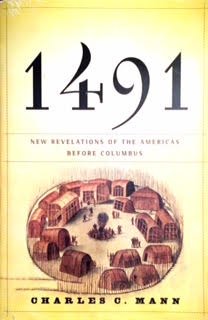
Maybe I should have been an anthropologist. AND THE BEHRING LAND BRIDGE IS PROBABLY A LIE, did you KNOW?!! I mean, I think the mound building, the idea of building islands of forest over floodplains, the planting of entire forests.obviously amazing. And those six years when Tisquatum was living in Europe in slavery? I can't.

Most fascinating to me are the ways in which the Native Americans altered their landscapes, particularly in Central & South America, and the way that, in the interim between conquistadors/explorers bringing their guns and diseases and actual settlers arriving, MILLIONS of natives died and the land returned to a state that appeared, to colonists, to be "untouched wilderness". I really love ancient civilizations, so this was bound to be a homerun, but it's also just amazing how much I was lied to in school. I'm absolutely going to read 1491, the adult book that this book was derived from, because-I mean. I remember browsing through this book at the library several years ago and being astonished, but I couldn't remember exactly what it was that had so surprised me well, basically, everything in this book was a surprise. Though interesting (and certainly better than nothing) I definitely still feel like I need to read the adult version to get the full picture. The format of Before Columbus could be better- it's too dry and textbook-y for kids, but too bare-bones for adult research. I don't have any contention with Mann's information (though how would I know), but I do wish this work featured more knowledge and perspective gleaned from modern Native populations, rather than just (mostly white, lbr) historians and archaeologists. I learned a lot from this small book, though I still think I need to read the adult version for a more comprehensive and nuanced look at the facts. Other than some history of local Native tribes, we barely studied the history of the Americas in school when I was growing up, and unfortunately I didn't pursue it in college either. When the Indians suddenly lost massive numbers of people to disease, they could no longer manage their ecosystems on that scale, and things started to change. The Native Americans managed their ecosystems on a large scale.

Someday I'll get around to tackling 1491, but this young reader's version seems to sum up Mann's main ideas well.


 0 kommentar(er)
0 kommentar(er)
